 Luxury cars make Asia premiere at Auto China
Luxury cars make Asia premiere at Auto China
 Versatile dog
Versatile dog
 Ni Ni covers BAZAAR JEWELRY
Ni Ni covers BAZAAR JEWELRY
 Cherry blossoms reach peak bloom in Washington D.C.
Cherry blossoms reach peak bloom in Washington D.C.
 Top Chinese fashion icons in foreigners' eyes
Top Chinese fashion icons in foreigners' eyes
 Asia's largest business aviation exhibition to be held in Shanghai
Asia's largest business aviation exhibition to be held in Shanghai
 World's top-rated luxury hotels
World's top-rated luxury hotels
 Wu Jing, Xie Nan to hold wedding on May
Wu Jing, Xie Nan to hold wedding on May
 London Cake International attracts tourists
London Cake International attracts tourists
 Let's dance in harmonic Shaanxi
Let's dance in harmonic Shaanxi
 |
| A wooden sign (C) reading "Prime Minister Shinzo Abe" is seen on a ritual offering from the prime minister to Yasukuni Shrine at the shrine in Tokyo in this picture taken by Kyodo April 21, 2014. Abe has sent the ritual offering to the shrine, seen by critics as a symbol of Japan's past militarism, media reported on Monday.(China Daily) |
Beijing and Seoul lodge protest as act shows 'mistaken attitude toward history'
China and South Korea slammed Japanese Prime Minister Shinzo Abe's ritual offering to a war-linked shrine on Monday, accusing Abe of attempting to whitewash Japan's wartime atrocities.
Abe sent a sacred tree branch engraved with his name and official title "Prime Minister Shinzo Abe" to Tokyo's Yasukuni Shrine.
The shrine celebrates militarism and, according to Shinto belief, houses the souls of Japan's wartime military leaders, including 14 convicted Class-A war criminals.
But Japanese Chief Cabinet Secretary Yoshihide Suga said Abe made the offering as a "private citizen".
Beijing lodged a diplomatic protest to Tokyo on Monday, saying that Abe's offering and recent visits by Japanese ministers to the shrine showed the Cabinet's "mistaken attitude toward history", said Foreign Ministry spokesman Qin Gang.
The Yasukuni Shrine is damaging to Japan's image, which will worsen "if the Japanese leader persists" in being linked to the shrine, Qin warned.
South Korea also denounced Abe's offering on Monday and said in a statement by its foreign ministry that Abe's move was an "anachronistic act that hampered friendly ties among neighboring countries as well as stability in the region".
Yang Bojiang, deputy director of the Institute of Japan Studies at the Chinese Academy of Social Sciences, said that through the ritual offering Abe is attempting to appease supporters of the far right, while at the same time to keep the support of those who are against revising history by not actually visiting the shrine.
"Abe wants to play both sides, yet he will probably fail and displease both sides in the end," Yang warned.
Abe visited the shrine in December, an act that saw tension in Japan's strained relationship with China and South Korea escalate, and drew rare criticism from Washington.
The offering made headlines just two days ahead of US President Barack Obama's visit to Tokyo.
Japan's NTV television quoted sources close to the prime minister as saying that Abe avoided a shrine visit this time for fear of drawing a similar critical response from Washington.
Yang said Washington may tolerate an increasing assertiveness in Japan's defense policy to ensure US engagement in the region, but the Obama administration is unlikely to tolerate playing to the far right.
"Reactions from Washington toward Abe's cabinet provocations were negative. This is to prevent US strategic interests in the region from being affected by the diplomatic deadlock between Japan and its neighbors - China and South Korea," Yang said.
When Abe walked past journalists on Monday morning, one asked about his feelings about the offering.
Abe shied away from the question and just replied "good morning", according to Japanese television.
Suga, the top government spokesman, also did not comment on Abe's offering but did say it will not affect Obama's trip to Tokyo. "There will be no impact at all," Suga said.
Ruan Zongze, vice-president of the China Institute of International Studies, said Washington has already expressed unease with Japan, its traditional ally, because "Abe is increasingly unreliable and unpredictable".
When visiting Japan last year, US Vice-President Joe Biden warned Tokyo against provocations that will anger Japan's neighbors, but Abe ignored them, Ruan said.
"Washington expected Tokyo to show more sincerity, not to mention Tokyo's attempts to manipulate the US-Japan alliance for Japan's own agenda," Ruan said.
Japan's Health, Labor and Welfare Minister Norihisa Tamura and speakers of both chambers of the Japanese Diet also made offerings to the shrine on Monday.
Keiji Furuya, chairman of Japan's National Public Safety Commission, visited the shrine on Sunday and Yoshitaka Shindo, internal affairs minister, visited earlier this month.
Zhou Yongsheng, a professor of Japan studies at China Foreign Affairs University, said although Abe has considered possible criticisms from the US and Europe against the shrine visit, he has refused to restrain his cabinet members from visiting the shrine.
"Actually he is trying to mislead the whole world by projecting an image of frequent visits by cabinet members to the shrine," Zhou said.
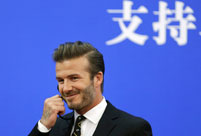 Beckham launches fund to support youth soccer in China
Beckham launches fund to support youth soccer in China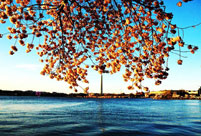 Cherry blossoms hit peak bloom in Washington D.C.
Cherry blossoms hit peak bloom in Washington D.C.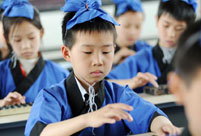 Children in ancient costumes learn Zhusuan
Children in ancient costumes learn Zhusuan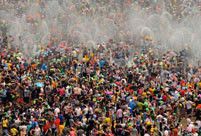 Tens of thousands celebrate Water Splashing Festival
Tens of thousands celebrate Water Splashing Festival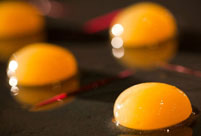 A bite of China II whets the appetite
A bite of China II whets the appetite Chinese frigate completes its 14th escort mission
Chinese frigate completes its 14th escort mission Let's dance in wealthy Shaanxi
Let's dance in wealthy Shaanxi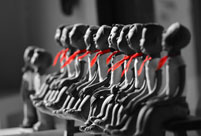 A date with 798: feel the art around you
A date with 798: feel the art around you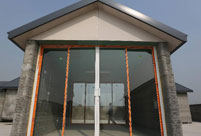 3D-printed houses built in Shanghai
3D-printed houses built in Shanghai The backstage of the Fashion Week
The backstage of the Fashion Week College students in Han costumes
College students in Han costumes Postgraduate works as waitress
Postgraduate works as waitress Life in a Lahu village in Yunnan
Life in a Lahu village in Yunnan An orphan’s wedding
An orphan’s wedding Hollywood documentary brings Diaoyu Islands truth to new audience
Hollywood documentary brings Diaoyu Islands truth to new audienceDay|Week|Month